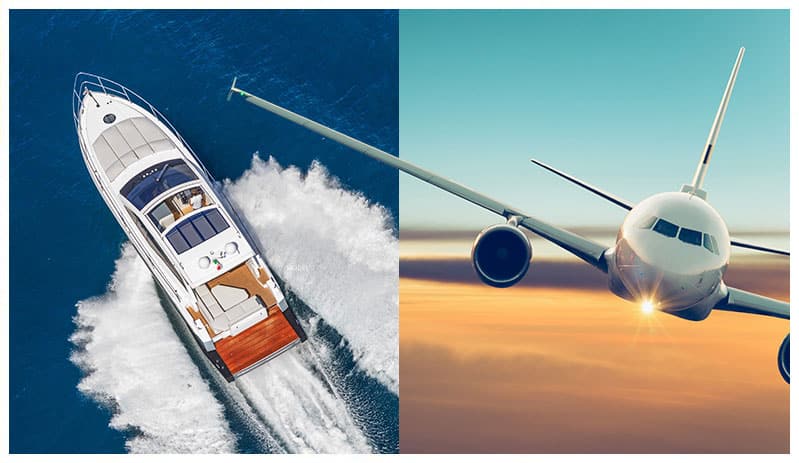Aviation and Marine Insurance

Whether used for work or pleasure, your boat or plane is a prized possession and should be treated as such. Aviation and marine insurance help protect personal and business aircraft and watercraft in case of an unfortunate collision, theft, or accidental damage. Coverage policies can include:
- Aerospace product manufacturers’ liability
- Airport owners and operators’ liability
- Aviation/Marine general liability
- Carrier’s legal liability
- Hangar keepers protection
- Hull and machinery protection
- Inventory/Cargo coverage
- Marina operators legal liability
- Passenger liability
- Terminal and hangar property and liability
What Is Marine Insurance?
Marine insurance covers a wide range of watercraft, including boats, yachts, and ships. It not only covers liability and damage to ships and vessels but also the cargo, terminals, and sometimes onshore and offshore property.
Policies typically exclude loss caused by willful/deceitful misconduct of the insured, ordinary leakage, ordinary losses in weight or volume or normal wear and tear, and loss indicated by inherent characteristics or nature of the subject matter (such as perishable commodities and loss caused by delay).
What Is Aviation Insurance?
Like marine insurance, aviation insurance is a broad category. Aviation insurance is a form of property and liability coverage for flying machines. This can include airplanes, seaplanes, vintage specimens, and other kinds of aircraft. It can also include properties such as hangars where planes are kept and, in some cases, the coverage for companies that manufacture aerospace products.
Aviation policies may exclude coverage for intentional acts, criminal activities, general wear and tear, or mechanical breakdown.
What Does Coverage Include?
Aviation Insurance
Operating an aviation supply company or an airport facility comes with risks. Aviation coverage protects from hazards related to aircraft hull and liability, war, general liability, and personal accidents. The terminology involved with this policy is specifically tailored to aircraft.
Marine Cargo and Transit Insurance
Many threats exist when products are being transported around the world. Items can be stolen or accidentally damaged, and other malicious actions can occur. Imports and exports can benefit from Goods in Transit (GIT) insurance coverage as part of a marine cargo insurance policy. Marine cargo coverage helps protect goods while being transported, whether by sea or air.
Marine insurance protects the sea vessel and staff involved in traveling and personally owned boats. The terminology involved with this policy is specifically tailored to watercraft.
Protecting Your Team and Assets
We specialize in boat and aircraft insurance at Gallant Risk & Insurance Services, LLC. Whether you have a personal watercraft, helicopter, a bass boat, a spacious yacht, or you are a pilot or supply products to an airport, we can recommend an insurance policy to meet your needs and keep your vessels and crew safe in the event of an unfortunate situation.
Frequently Asked Questions About Aviation and Marine Insurance
What is the difference between marine and boat insurance?
Boat insurance is designed to protect smaller boats and personal watercraft. This is specifically for private boats, yachts, and personal watercraft and can cover damages to the vessel, liability for accidents on the water, and, in some cases, personal property on the boat. In most cases, boat insurance provides more limited coverage than marine insurance. Vessels included in the category of boat insurance:
- Fishing boats
- Powerboats
- Pontoon boats
- Sailboats
- Personal watercraft such as WaveRunners, Seadoos, and Jet Skis
What is pollution liability insurance?
Pollution liability insurance covers you in the event of a fuel spill. It can cover cleanup, treating, detoxifying, removal costs and any potential lawsuits resulting from the spill. This may be especially useful to add to your marine insurance policy, as the cost of cleanup or lawsuits resulting from pollution can be pretty costly.
How do I determine the correct hull value for my aircraft?
If you are buying an aircraft hull insurance policy, it may be written on an “agreed value” basis. This means that both you and the insurance company have agreed on what the value will be before the accident takes place. Most insurance companies will cover repairing an aircraft if the damage is less than 65 percent of its insured value. However, some don’t.
To be safe, the correct insured value should be the amount it would take for you to buy the same aircraft.
What do I do when I discover a loss or damage to a shipment?
You should follow the steps outlined on your Certificate of Insurance:
- Report the loss, stating that you want to submit a claim for the loss
- Contact the recommended surveyor to determine the extent of the loss
- Reach out to your cargo insurance broker to simplify the claim process
What happens if I under-value freight for cargo insurance purposes?
The total value of your shipment at its intended final destination should be declared to your insurer when you ship goods. If you under-declare the value of a shipment, your insurer might calculate your payout based on the lower declared amount rather than the actual market value of your goods.
What is the difference between inland transit insurance and ocean cargo insurance?
An inland transit insurance policy covers domestic warehouse-to-warehouse shipments, while ocean cargo insurance covers international shipments on a warehouse-to-warehouse basis, including the conveyance of the freight between the two warehouses.
I invested money in improving my boat/aircraft. Can I increase the insured limit/value based on the improvements?
Yes, you can. Just provide us with the records and the receipts for the improvement (these need to be accepted by the insurer). In some cases, a survey might be required.
Can I let someone borrow my boat/aircraft?
Well, it depends. Some policies are “named operator,” while others are “permissive use.” The former requires that anyone operating the boat is approved by the insurers or named on the policy for compensation to apply. The latter allows anyone with your permission to use the boat, and coverage still applies.